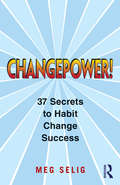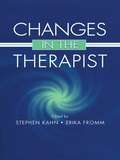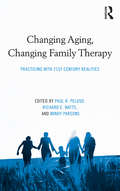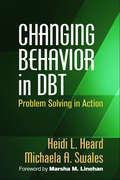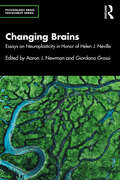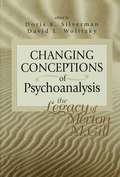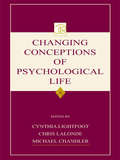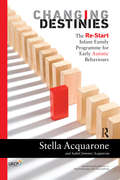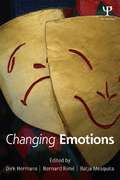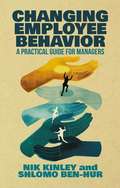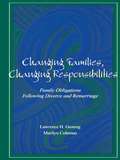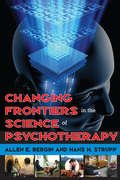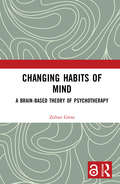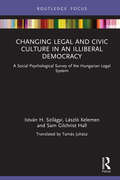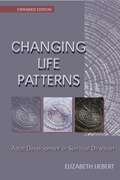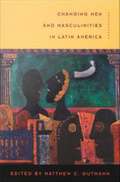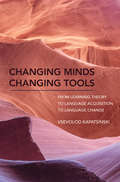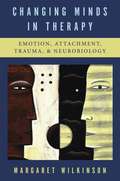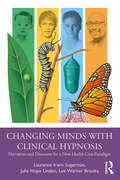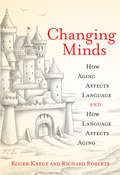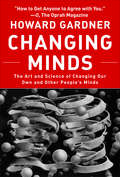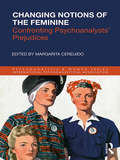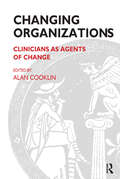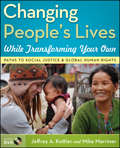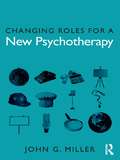- Table View
- List View
Changepower!: 37 Secrets to Habit Change Success
by Meg SeligIn Changepower! 37 Secrets to Habit Change Success, author Meg Selig guides readers through a step-by-step process that will help them achieve any habit change goal. Whether the reader wants to break a hurtful habit like smoking or overeating, or build a healthy habit like exercising or speaking up, Changepower! provides a springboard for change. Selig helps habit-changers move beyond willpower and succeed with changepower - the synergy that comes from combining willpower with other resources, useful outside supports, and wise strategies. In Changepower!, she shows habit-changers how to beef up both their willpower and their changepower to achieve habit change success. The key is revving up motivation. Selig reveals the most powerful motivators for change - pain motivators, the Eight Great Motivators, and even not-so-noble motivators. Research has shown that most changes take place in stages rather than overnight. Selig provides a step-by-step plan for each stage, leaving plenty of room for flexibility depending on each person’s needs. First-person stories, pithy quotes, and how-to exercises provide inspiration, humor, and encouragement as readers embark on their habit change journeys.
Changes in the Therapist
by Stephen Kahn Erika FrommModern therapy has shifted its emphasis to focus on the interpersonal field and on "mutuality of influence." The therapist and the patient are now seen as participating in an ongoing feedback loop, with each influencing the other. This interpersonal focus has brought the therapists and their reactions more into the foreground. Experiences with patients can, in fact, have strong reverberations in practitioners' own lives and can be the cause or source of essential changes in the psyche of the therapist. This book is the first to explore how efforts to work through issues in therapeutic relationships may permanently affect therapists' beliefs, feelings, and/or actions. The authors, all highly regarded senior clinicians, describe their own reactions and the types of changes that they went through as a consequence of their treatment of a particular patient. They do not make the therapeutic process seem artificially smooth and seamless. In probing their own struggles and difficulties, they illuminate the in-depth workings of the therapeutic relationship. The editors' introduction constructs a systematic framework within which to think about the changes the authors recount. Changes in the Therapist will be of compelling interest to all those involved in therapy.
Changing Aging, Changing Family Therapy: Practicing With 21st Century Realities (Routledge Series on Family Therapy and Counseling)
by Paul R. Peluso - Richard E. Watts - Mindy ParsonsAs the baby boomers move into retirement and later stages of life, gerontology and geriatrics have begun to receive much more attention. Changing Aging, Changing Family Therapy explores the ways in which family therapists’ expertise in systems theory makes them uniquely qualified to take a leading role in helping families and individuals cope with the challenges and changed circumstances that aging brings. Clinicians will find detailed coverage and practical guidelines on a wealth of vital topics, including coping with the illness of a parent or partner, working past retirement age, outliving one’s savings, preserving physical and mental well-being over time, and more.
Changing Behavior in DBT: Problem Solving in Action
by Heidi L. Heard Michaela A. SwalesThis book delves into problem solving, one of the core components of dialectical behavior therapy (DBT). The authors are leading DBT trainers who elucidate the therapy's principles of behavior change and use case examples to illustrate their effective application. Particular attention is given to common pitfalls that therapists encounter in analyzing target behaviors--for example, a suicide attempt or an episode of bingeing and purging--and selecting and implementing appropriate solutions. Guidelines are provided for successfully implementing the full range of DBT problem-solving strategies, including skills training, stimulus control and exposure, cognitive restructuring, and contingency management.
Changing Brains: Essays on Neuroplasticity in Honor of Helen J. Neville
by Aaron J. Newman Giordana GrossiThis book celebrates the pioneering work and contributions of Helen J. Neville, who conducted seminal neuroimaging work using electroencephalography (EEG) and functional magnetic resonance imaginf (fMRI) to illustrate the role that experience plays in shaping the brain. Bringing together her former students, collaborators, and colleagues, the book presents essays and original empirical research that pay tribute to Helen Neville’s groundbreaking work. The chapters discuss her contributions to our knowledge of neuroplasticity in perception, attention, and language, and how they inspired more recent developments in these and related areas, such as work on deafness (changes in sign language processing with age and the effects of cochlear implants on language development), the early stages of reading, memory consolidation during sleep, and the connection between attentional and memory systems. The book also discusses her strong commitment to rigorous science that could be translated into real-world practice through social interventions to improve neurodevelopmental outcomes. It additionally includes short poems by Marta Kutas interspersed between chapters that are inspired by Helen’s work and highlight her contributions, values, and ideas. The book showcases Helen Neville’s legacy to the field of neuroscience and is a must-read for all students and researchers of neuroplasticity and developmental cognitive neuroscience.
Changing Conceptions of Psychoanalysis: The Legacy of Merton M. Gill
by Doris K. Silverman David L. WolitzkyThis outstanding memorial volume records and reassesses the contributions of Merton M. Gill (1914-1994), a principal architect of psychoanalytic theory and a principled exemplar of the modern psychoanalytic sensibility throughout the second half of the 20th century. Critical evaluations of Gill's place in psychoanalysis and a series of personal and professional reminiscences are joined to substantive reengagement of central controversies in which Gill played a key part. These controversies revolve around the "natural science" versus "hermeneutic" orientation in psychoanalysis (Holt, Eagle, Friedman); the status of psychoanalysis as a one-person and/or two-person psychology (Jacobs, Silverman); pyschoanalysis versus psychotherapy (Wallerstein, Migone, Gedo); and the meaning and use of transference (Kernberg, Wolitzky, Cooper).
Changing Conceptions of Psychological Life (Jean Piaget Symposia Series)
by Cynthia LightfootChanging Conceptions of Psychological Life is an interdisciplinary look at personal constructions of self. This book is a product of the 30th Annual Meeting of the Jean Piaget Society. The contributing authors constitute the original cast invited to speak on the theme of how individuals come to construe psychological lives--their own and others. Their concerns are how our sense of ourselves emerges developmentally, culturally, and historically, and the implications such constructions have for personal, social, and political change. Together, the authors compose an international and interdisciplinary group of scholars well regarded for their work on topics as diverse as adolescence, language, aging, romance, and morality. Creating a level of discourse about selves and mind--and how they have been and should be studied--the volume is broken down into four parts; Part I includes work that is principally concerned with elevating the position of our experience of ourselves in constructing who we are. The next section focuses on the corrections presumed to exist between the conceptions of self and the conceptions of mental life. Each chapter offers additional information on the dynamics of temperament, attachment, personality, and regulation. Part III is concerned with cultural contexts that frame developing conceptions of self and mental life. Finally, the last section situates conceptions of mental life directly and dramatically in the social contexts of their making. Readers will find in these pages a programmatic effort variously attuned to selves and minds as dynamic and structured, present and represented, felt and known, non-languaged and storied, and embodied and theorized. The volume is suitable for certain upper-level undergraduate and graduate seminars dealing with clinical, cognitive, cultural, and developmental matters and sought out by active researchers and practitioners in the field.
Changing Destinies: The Re-Start Infant Family Programme for Early Autistic Behaviours (The\united Kingdom Council For Psychotherapy Ser.)
by Stella AcquaroneThe term 'pre-autism' is becoming more widespread as a result of growing awareness of the importance of a child's first three years of life in diagnosing behaviours which, if untreated, can develop into autism. In this book we are shown the problems parents can experience when their young child does not respond to them in a 'typical' way, how they often voice concerns that something is 'not quite right' with their child, and how it is important to address these concerns, which may be signs of pre-autism. This book is about a new approach called 'Re:Start', developed by Stella Acquarone, to diagnose and treat early autism. In the Re:Start infant/family programme, a multidisciplinary team works with the parents and through the family relationships to reconfigure dysfunctional dynamics with the aim to "change destinies".
Changing Emotions
by Batja Mesquita Dirk Hermans Bernard RiméThe question ‘how far can emotions be changed?’ lies at the heart of innumerable psychological interventions. Although often viewed as static, changes in the intensity, quality, and complexity of emotion can occur from moment to moment, and also over longer periods of time, often as a result of developmental, social or cultural factors. Changing Emotions highlights several recent developments in this intriguing domain, and provides a comprehensive guide for understanding how and why emotions change. The chapters are organized into five parts: • Lifespan Perspective• Learning Perspective• Social-Cultural Perspective• Emotional-Dynamics Perspective• Intervention Perspective. In each chapter an internationally renowned scholar presents a concise review of key findings from their own research perspective. The book will be of great interest to researchers in the area of emotion and emotion regulation as well as related fields such as developmental psychology, educational psychology, social, clinical psychology and psychotherapy. It may also be of interest to sociologists, philosophers, and economists interested in learning more about emotions.
Changing Employee Behavior
by Shlomo Ben-Hur Nik KinleyAn important part of every manager's job is changing people's behavior: to improve someone's performance, get them to better manage relationships with colleagues, or to stop them doing something. Yet, despite the fact that changing people's behavior is such an important skill for managers, too many are unsure how to actually go about it. This book reveals the simple, but powerful techniques for changing behavior that experts from a range of disciplines have been using for years, making them available to all managers in a single and comprehensive toolkit for change that managers can use to drive and improve the performance of their staff. Based on research conducted for this book, it introduces practical techniques drawn from the fields of psychology, psychotherapy, and behavioral economics, and show how they can be applied to address some of the most common, every-day challenges that managers face. #changingpeople
Changing Families, Changing Responsibilities: Family Obligations Following Divorce and Remarriage
by Lawrence Ganong Marilyn ColemanThis book explores the topic of family obligations following changes in family structure caused by divorce and remarriage. Family obligations are commonly defined as the rights and duties that accompany family roles. They have been described as the "glue" that connects generations, as well as the "oughts" and "shoulds" that surround individual family relationships. This book is primarily concerned with normative beliefs about what family members should do for each other. It differs from previous accounts of family obligation norms because it specifically focuses on family responsibilities after divorce and remarriage, two events that affect an increasing number of families today. The authors draw extensively upon the findings of 13 studies of normative beliefs regarding post-divorce intergenerational family obligations. This book fills a gap in the present literature concerning family obligation. It addresses the weaknesses of prior research by focusing on family transitions and by presenting data from studies that employ contextual methods. The content will provide guidance to policymakers and helping professionals who work with families, and the unique focus and procedures of the studies are likely to set the standard for future assessments of normative beliefs about family obligations.
Changing Frontiers in the Science of Psychotherapy
by Irving BabbittThis book is an exploration and mapping of the frontiers of research in psychotherapy. The authors make a systematic effort to discover where the science is going; analyzing conceptual problems, trends, and issues; record their interviews with the leaders in the field; and recommend new directions for research. The volume is the result of a three-year study on collaborative research in psychotherapy by the National Institute of Mental Health, and was first published in 1972.In Changing Frontiers in the Science of Psychotherapy Allen E. Bergin and Hans H. Strupp introduce the reader to therapeutic science as it appeared to them during a three year process of evaluating available literature, conducting interviews with scientists and therapists, and exchanging and formulating viewpoints. Personal reflections and experiences were gleaned from working papers, correspondence, and personal material, all of which gave life to the ongoing processes of science and provide considerable insight into everyday reality behind the scenes.The prominent therapists interviewed in this book include Arnold A. Lazarus, Lester Luborsky, Arthur H. Auerbach, Lyle D. Schmidt, Stanley R. Strong, Paul E. Meehl, Howard F. Hunt, Bernard F. Riess, Thomas S. Szasz, Arnold P. Goldstein, Gerald C. Davison, Bernard Weitzman, J. B. Chassan, Kenneth M. Colby, Albert Bandura, Robert S. Wallerstein, Harold Sampson, Louis Breger, Howard Levene, Ralph R. Greenson, Milton Wexler, Carl B. Rogers, Charles B. Traux, Joseph D. Matarazzo, Neal E. Miller, Henry B. Linford, Peter H. Knapp, John M. Shlien, David Bakan, Marvin A. Smith, and Peter J. Lang, all of whom remain leading figures in the literature on psychotherapy.
Changing Habits of Mind: A Brain-Based Theory of Psychotherapy
by Zoltan GrossChanging Habits of Mind presents a theory of personality that integrates homeostatic dynamics of the brain with self-processes, emotionality, cultural adaptation, and personal reality. Informed by the author’s brain-based, relational psychotherapeutic practice, the book discusses the brain’s evolutionary growth, the four information-processing areas of the brain, and the cortex in relationship to the limbic system. Integrating the different experiences of sensory and non-sensory processes in the brain, the text introduces a theory of personality currently lacking in psychotherapy research that integrates neurobiology and psychology for the first time. Readers will learn how to integrate psychodynamic processes with cognitive behavioral techniques, while clinical vignettes exemplify the interaction of neurophysiological process with a range of psychological variables including homeostasis, developmental family dynamics, and culture. Changing Habits of Mind expands the psychotherapist’s perspective, exploring the important links between an integrated theory of personality and effective clinical practice.
Changing Legal and Civic Culture in an Illiberal Democracy: A Social Psychological Survey of the Hungarian Legal System
by István H. Szilágyi László Kelemen Sam Gilchrist HallChanging Legal and Civic Culture in an Illiberal Democracy is a unique empirical study on recent developments in legal and civic consciousness in Hungary. Drawing its methodology from social psychology, this book illuminates a shift in legal consciousness during the time in which Orbán’s government has cemented Hungary’s reputation as an illiberal democracy. The book foregrounds the voices of the Hungarian population in how they view the shift towards increasingly right-wing politics and an erosion of the rule of law. It opens with an extensive theoretical introduction of the historical development and psychological dimensions of legal consciousness in Hungary and relates the Hungarian research to international developments. It then presents its empirical results and offers a jargon-free account of ordinary people’s changing perceptions of their relationship to Hungary’s civic and legal cultures, before finally examining the correlations between surveys. Methodologically, the book establishes that theories of legal consciousness and social change are bolstered by empirical data. Offering a new way of approaching shifts in legal consciousness and the rule of law in Balkan and Eastern European countries, this text will be of great interest to researchers and students of social psychology, law, international relations and Central European studies.
Changing Life Patterns: Adult Development In Spiritual Direction
by Elizabeth LiebertThis landmark work, originally published in 1992, traces the various stages of spiritual development and discusses how developmental change can be fostered in individual and congregational settings.
Changing Men and Masculinities in Latin America
by Matthew C. GutmannRanging from fatherhood to machismo and from public health to housework, Changing Men and Masculinities in Latin America is a collection of pioneering studies of what it means to be a man in Latin America. Matthew C. Gutmann brings together essays by well-known U. S. Latin Americanists and newly translated essays by noted Latin American scholars. Historically grounded and attuned to global political and economic changes, this collection investigates what, if anything, is distinctive about and common to masculinity across Latin America at the same time that it considers the relative benefits and drawbacks of studies focusing on men there. Demonstrating that attention to masculinities does not thwart feminism, the contributors illuminate the changing relationships between men and women and among men of different ethnic groups, sexual orientations, and classes. The contributors look at Mexico, Argentina, Ecuador, Brazil, Colombia, Peru, Venezuela, Chile, and the United States. They bring to bear a number of disciplines--anthropology, history, literature, public health, and sociology--and a variety of methodologies including ethnography, literary criticism, and statistical analysis. Whether analyzing rape legislation in Argentina, the unique space for candid discussions of masculinity created in an Alcoholics Anonymous group in Mexico, the role of shame in shaping Chicana and Chicano identities and gender relations, or homosexuality in Brazil, Changing Men and Masculinities highlights the complex distinctions between normative conceptions of masculinity in Latin America and the actual experiences and thoughts of particular men and women. Contributors. Xavier Andrade, Daniel Balderston, Peter Beattie, Stanley Brandes, Hctor Carrillo, Miguel Daz Barriga, Agustn Escobar, Francisco Ferrndiz, Claudia Fonseca, Norma Fuller, Matthew C. Gutmann, Donna Guy, Florencia Mallon, Jos Olavarra, Richard Parker, Mara Viveros
Changing Minds Changing Tools: From Learning Theory to Language Acquisition to Language Change
by Vsevolod KapatsinskiA book that uses domain-general learning theory to explain recurrent trajectories of language change. In this book, Vsevolod Kapatsinski argues that language acquisition—often approached as an isolated domain, subject to its own laws and mechanisms—is simply learning, subject to the same laws as learning in other domains and well described by associative models. Synthesizing research in domain-general learning theory as it relates to language acquisition, Kapatsinski argues that the way minds change as a result of experience can help explain how languages change over time and can predict the likely directions of language change—which in turn predicts what kinds of structures we find in the languages of the world. What we know about how we learn (the core question of learning theory) can help us understand why languages are the way they are (the core question of theoretical linguistics). Taking a dynamic, usage-based perspective, Kapatsinski focuses on diachronic universals, recurrent pathways of language change, rather than synchronic universals, properties that all languages share. Topics include associative approaches to learning and the neural implementation of the proposed mechanisms; selective attention; units of language; a comparison of associative and Bayesian approaches to learning; representation in the mind of visual and auditory experience; the production of new words and new forms of words; and automatization of repeated action sequences. This approach brings us closer to understanding why languages are the way they are, Kapatsinski contends, than approaches premised on innate knowledge of language universals and the language acquisition device.
Changing Minds in Therapy: Emotion, Attachment, Trauma, and Neurobiology (Norton Series on Interpersonal Neurobiology)
by Margaret WilkinsonAddresses the flurry of questions about the practical application of neuroscience in clinical treatment. Recent advances in research in the fields of attachment, trauma, and the neurobiology of emotion have shown that mind, brain, and body are inextricably linked. This new research has revolutionized our understanding of the process of change in psychotherapy and in life, and raised a flurry of questions about the practical application of neuroscience in clinical treatment, particularly with those who have experienced early relational trauma and neglect. What insight does neuroscience offer to our clinical understanding of early life experiences? Can we use the plasticity of the brain to aid in therapeutic change? If so, how? Changing Minds in Therapy explores the dynamics of brain-mind change, translating insights from these new fields of study into practical tips for therapists to use in the consulting room. Drawing from a wide range of clinical approaches and deftly integrating the scholarly with the practical, Margaret Wilkinson presents contemporary neuroscience, as well as attachment and trauma theories, in an accessible way, illuminating the many ways in which cutting edge research may inform clinical practice.
Changing Minds with Clinical Hypnosis: Narratives and Discourse for a New Health Care Paradigm
by Laurence Sugarman Julie Hope Linden Lee Warner BrooksThis book is a scientifically current, integrative, and practical guide for understanding clinical hypnosis and its place within a new health care paradigm. Blending four original short stories with a treatise, it alternates narrative prose with health science discourse to create a framework for embracing systemic emotional and relational elements that lie beyond diagnosis, medication, surgery, and psychotherapy. Following the stories of four characters, the authors establish an empirically-grounded conceptualization of the mind, then demonstrate how practical applications of therapeutic hypnosis can help readers use individual and family resources in health and healing. Clinicians will learn to improve their care by embracing emotional, relational, and narrative elements that powerfully affect health beyond diagnosis, medication, surgery, and psychotherapy. Further, health care educators and policy makers will find inspiration that enriches professional training.
Changing Minds: How Aging Affects Language and How Language Affects Aging (The\mit Press Ser.)
by Richard Roberts Roger KreuzWhy language ability remains resilient and how it shapes our lives.We acquire our native language, seemingly without effort, in infancy and early childhood. Language is our constant companion throughout our lifetime, even as we age. Indeed, compared with other aspects of cognition, language seems to be fairly resilient through the process of aging. In Changing Minds, Roger Kreuz and Richard Roberts examine how aging affects language—and how language affects aging. Kreuz and Roberts report that what appear to be changes in an older person's language ability are actually produced by declines in such other cognitive processes as memory and perception. Some language abilities, including vocabulary size and writing ability, may even improve with age. And certain language activities—including reading fiction and engaging in conversation—may even help us live fuller and healthier lives.Kreuz and Roberts explain the cognitive processes underlying our language ability, exploring in particular how changes in these processes lead to changes in listening, speaking, reading, and writing. They consider, among other things, the inability to produce a word that's on the tip of your tongue—and suggest that the increasing incidence of this with age may be the result of a surfeit of world knowledge. For example, older people can be better storytellers, and (something to remember at a family reunion) their perceived tendency toward off-topic verbosity may actually reflect communicative goals.
Changing Minds: The Art and Science of Changing Our Own and Other People's Minds
by Howard GardnerThink about the last time you tried to change someone's mind about something important: a voter's political beliefs; a customer's favorite brand; a spouse's decorating taste. Chances are you weren't successful in shifting that person's beliefs in any way. In his book, Changing Minds, Harvard psychologist Howard Gardner explains what happens during the course of changing a mind - and offers ways to influence that process. Remember that we don't change our minds overnight, it happens in gradual stages that can be powerfully influenced along the way. This book provides insights that can broaden our horizons and shape our lives.
Changing Notions of the Feminine: Confronting Psychoanalysts' Prejudices (Psychoanalysis and Women Series)
by Margarita CereijidoAs culture changes, so do notions of the feminine. Today, women are exploring new gender identities, gender dynamics, and family configurations. They are questioning and redefining what it is to be feminine and expressing different attitudes toward motherhood. These issues have challenged classic psychoanalytic theory and practice. In this timely collection, a range of prominent psychoanalysts confront and explore their prejudices about changing notions of the feminine, and how it impacts their work. In a period of transition, these issues are present in the clinical material of female patients, and in the material of male patients who struggle in their complementary roles as partners and fathers. But how analysts listen and give meaning to clinical material is significantly affected by the analyst’s own prejudices, her implicit and explicit theories, as well as her subjective view of the world. Discussing topics such as the expression of power, the compatibility of assertiveness and ambition with the feminine, and the psychoanalytic impact of the spread of new reproductive techniques, this important and far-reaching book will be essential reading for any psychoanalyst or psychotherapist who wishes to engage actively with the sociocultural moment in which they work.
Changing Organizations: Clinicians as Agents of Change (The Systemic Thinking and Practice Series)
by Alan CooklinThis work provides a rich mine of ideas to stimulate thinking about organisational interaction, and organisations in relation to various socio/cultural values.
Changing People's Lives While Transforming Your Own
by Jeffrey A. Marriner Mike KottlerBy supporting others and promoting change, helping professionals also enjoy the benefit of personal growth. Changing People's Lives While Transforming Your Own is filled with narratives from individuals from social work, psychology, counseling, and allied health fields. Inspiring and stirring, this book vividly illustrates how to promote social justice and foster global human rights. Its accompanying DVD features stories from a social justice mission to Nepal reaching out to neglected children. Students and professionals will find this book a profound reminder of how targeted social justice efforts have resulted in transformative experiences. Note: CD-ROM/DVD and other supplementary materials are not included as part of eBook file.
Changing Roles for a New Psychotherapy
by John G. MillerPsychotherapy is not a “one size fits all approach.” As author John Miller describes in Changing Roles for a New Psychotherapy, all theoretical orientations have their uses and merits in different situations and with different clients. Through a varied personal life and professional career, in which he developed a creative psychotherapeutic approach that allows the adaptation of diverse roles with clients, Dr. Miller has gained insights through working in academia, the sciences, management consulting, and a state hospital. He applies these insights, along with those he gained working various summer jobs, to take readers beyond the standard medical model of diagnosis and treatment by drawing on the roles of other professionals. He examines 11 different occupations and explores how the insights gained in each field can enhance therapeutic possibilities. How does cooking relate to psychotherapy? Can accounting change the way psychotherapy is performed? Read on to find out!
